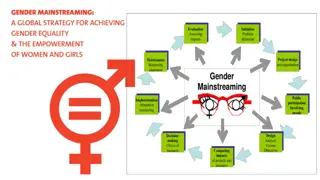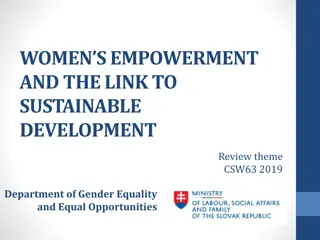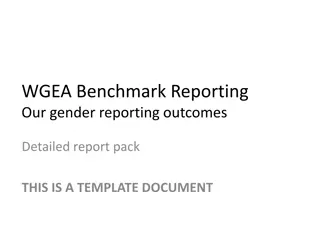Achieving Gender Equality for Lebanese Women
The roles of women in Lebanon have evolved over time, with the country showing progress towards sustainable empowerment goals. Despite this, Lebanese authorities are falling short of their international obligations to protect women and girls from violence and discrimination. Key areas requiring attention include amending outdated citizenship laws, breaking tradition in banking laws, and implementing quotas for women's political participation.
Download Presentation

Please find below an Image/Link to download the presentation.
The content on the website is provided AS IS for your information and personal use only. It may not be sold, licensed, or shared on other websites without obtaining consent from the author.If you encounter any issues during the download, it is possible that the publisher has removed the file from their server.
You are allowed to download the files provided on this website for personal or commercial use, subject to the condition that they are used lawfully. All files are the property of their respective owners.
The content on the website is provided AS IS for your information and personal use only. It may not be sold, licensed, or shared on other websites without obtaining consent from the author.
E N D
Presentation Transcript
Achieving Gender Equality Lebanese Women Rita Haddad Mater s degree In Management and monitoring of sustainable tourism, University of Cagliari, Platform 4 Rony Bouez Mater s degree In Architecture( conservation), Sapienza University di Roma, Platform
The roles of women in Lebanon have evolved throughout history. Lebanon is known for its active feminist movements in the Arab region.Lebanese women showed great progress towards sustainable empowerment goals. In 1997 Lebanon acceded to the Convention on the Elimination of All Forms of Discrimination Against Women (CEDAW). In 1998 Lebanon established the National Commission for Lebanese Women (NCLW).
Lebanese authorities are falling short international obligations women and girls from violence discrimination them. of their legal to protect and end against
Nationality (Articles 1, 2, 9 and 15) Lebanon s women married to foreigners by denying citizenship to their children and spouses, but not to the foreign spouses and children of Lebanese men. outdated citizenship law discriminates against Lebanon should amend the citizenship law to ensure that children and spouses of Lebanese women have the same right to citizenship as those of Lebanese men.
Even though Lebanons banking laws do not expressly prohibit women from opening bank accounts, traditionally only male guardians of minor children were allowed to open a bank account in a child s name, since fathers are considered the de facto custodians of their minor children. Lebanon should establish new laws to break the tradition
Third: A quota for women s political participation is required to ensure that women are elected to parliament.
We see women excelling in a variety of industries, in both the public and the private sector. Women are in senior positions and are leading successfully. However, this is not reflected in the political sphere. Today, Lebanon s government includes six women, a record in the country, since the political participation of women in Lebanon has long been limited. In 2018, 113 women registered their names as candidates in the parliamentary elections also an unprecedented number throughout the country s history- yet only six women made it to the parliament.
Fourth: Equal rights in a civil state
Lebanese women struggle to achieve equal gender rights in a country where discrimination against them is facilitated by 15 religion-based personal status laws. Family law in Lebanon falls under the ruling of religious courts. So each sect dictates its own rules concerning marriage, divorce, inheritance and custody, which are mostly unfair to women across all confessions. There is no law that forbids early marriage for girls in Lebanon. While some religions forbid marriage for men below the age of 18 years old, all religions allow the marriage of women before the age of 18 years old.
Example: Children custody is given to men in all Lebanese religions except the Greek Armenians, who give women the right to custody. If the father dies, guardianship may revert to his male relatives, and not the mother Women often have to give up custody of their children and any financial rights to obtain a divorce























